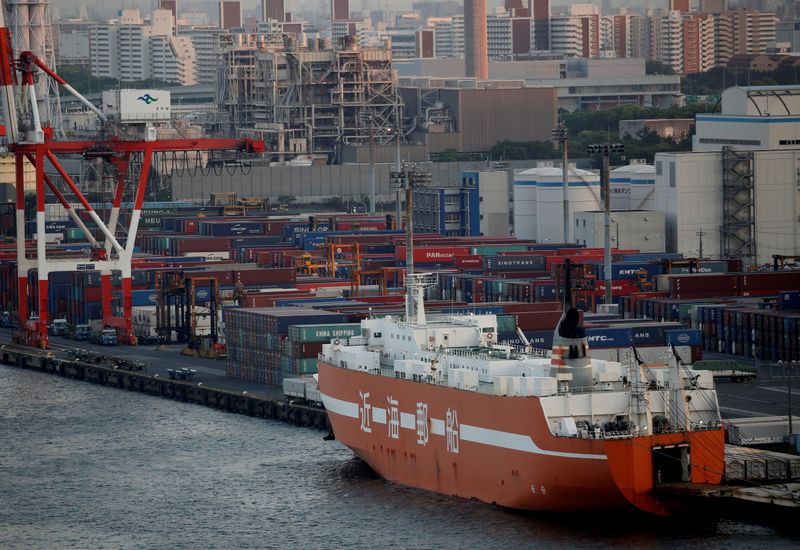By Daniel Leussink
TOKYO (Reuters) - Japan's exports slipped for a 12th straight month in November, as declining shipments to the United States and China hit the trade-reliant economy, raising the risk of a fourth-quarter contraction.
Official data released on Wednesday showed Japan's exports fell 7.9% year-on-year in November, a smaller decline than the 8.6% decline expected by economists in a Reuters poll.
However, it was the longest run of declines in exports since a 14-month stretch to November 2016 as shipments of cars and construction machinery to the United States and chemical products to China fell.
"Exports are quite weak. A recovery remained out in November even when looking at it on a volume basis," said Atsushi Takeda, chief economist at Itochu Economic Research Institute.
Exports in volume terms, which exclude the exchange rate impact, dropped 5.0% in the year to November, the largest fall since August and the fourth consecutive month of declines.
Japan's economy grew at a much faster pace than initially reported in the third quarter, data showed last week, thanks largely to improvements in business spending and private consumption.
But there are worries the third-quarter strength is masking widening cracks in the economy after the government went ahead with a nationwide tax hike in October, giving a big hit to corporate and household sentiment.
Japan's economy has been caught in the crossfire of the trade war between the United States and China this year, with increased protectionism and a related global slowdown hurting output and exports from the country.
Industrial output slipped at the fastest pace in nearly two years in October while retail sales and household spending slumped after consumers tightened their purse strings following the sales tax hike.
The Bank of Japan, however, is seen keeping monetary policy on hold at its two-day policy meeting ending on Thursday as progress in U.S.-China talks and a $122 billion fiscal package at home take some pressure off the central bank to support growth.
By region, exports to China, Japan's biggest trading partner, lost 5.4% year-on-year in November, down for the ninth month as shipments of chemicals and car parts declined.
Exports to Asia, which account for more than half of Japan's overall exports, dropped 5.7% in the year to November largely due to declining shipments of flat rollers to Thailand.
Japan's shipments to the United States declined for the fourth straight month, falling 12.9% in the year to November, hurt by reduced shipments of cars, construction machinery and car parts.
The weakness in U.S.-bound shipments is largely thanks to weak car sales as car and car parts, which account for about half of the exports to the United States, even as consumption and the world's top economy overall are doing well, said Itochu's Takeda.
"The U.S. and China have agreed on a Phase One Trade deal so it's likely tariffs ill be reduced and a worsening of tensions has been stopped," Takeda said.
He expects Japanese exports to the United States to stage a recovery in the coming months with U.S. capital spending set to rebound.
Under the trade agreement announced last week, Washington will reduce some tariffs on Chinese imports in exchange for Chinese purchases of agricultural, manufactured and energy products increasing by about $200 billion over the next two years.
Japanese Prime Minister Shinzo Abe previously agreed his own limited trade deal with the United States, which was approved by Japan's parliament this month, clearing the way for tariff cuts next year on items including U.S. farm goods and Japanese machine tools.
The nation's overall imports sank 15.7% year-on-year, marking their biggest decline since Oct. 2016, and a larger fall than the median estimate for a 12.7% decrease. That was partly due to weakened consumption after October's sales tax hike, economists said.

That decline in imports led to a 82.1 billion yen trade deficit, smaller than the 369.0 billion yen shortfall seen by economists.